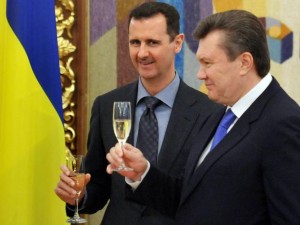 Syrian President Bashar al-Assad is taking advantage of the rift between Russia and the United States over Ukraine to press ahead with plans to crush the rebellion against his rule and secure his reelection for another seven-year term, unencumbered by pressure to compromise with his opponents.
Syrian President Bashar al-Assad is taking advantage of the rift between Russia and the United States over Ukraine to press ahead with plans to crush the rebellion against his rule and secure his reelection for another seven-year term, unencumbered by pressure to compromise with his opponents.
The collapse last month of peace talks in Geneva, jointly sponsored by Russia and the United States, had already eroded the slim prospects that a negotiated settlement to the Syrian war might be possible. With backers of the peace process now at odds over the outcome of the popular uprising in Ukraine, Assad feels newly confident that his efforts to restore his government’s authority won’t be met soon with any significant challenge from the international community, according to analysts and people familiar with the thinking of the regime.
Russian President Vladimir Putin’s defiant response to the toppling of Ukrainian President Viktor Yanukovych has further reinforced Assad’s conviction that he can continue to count on Russia’s unwavering support against the armed rebellion challenging his rule, said Salem Zahran, a Damascus-based journalist and analyst with close ties to the Syrian regime.
“The regime believes the Russians now have a new and stronger reason to keep Assad in power and support him, especially after the experience of Libya, and now Ukraine,” he said. “In addition, the regime believes that any conflict in the world which distracts the attention of the Americans is a factor which eases pressure on Syria.”
On Friday, tensions between Moscow and Washington showed no sign of abating, with Putin angrily rejecting the Obama administration’s attempt to bring about a withdrawal of Russian troops from Crimea by imposing sanctions.“Russia cannot ignore calls for help, and it acts accordingly, in full compliance with international law,” Putin said in a statement.
The Syrian war is only one of a number of contentious issues in the Middle East that expose the vulnerability of U.S. interests to a revival of Cold War-era tensions with Russia such as those that have surfaced in Ukraine. The nuclear accord with Iran and the Israeli-Palestinian peace talks, both of which rank higher on the Obama administration’s foreign policy agenda than Syria, are also dependent to an extent on Moscow’s cooperation.
In a less-noted development in recent months, newly ambivalent U.S. allies such as Egypt and Iraq have been quietly concluding significant arms deals with Moscow, largely spurred by concerns that the Obama administration’s reluctance to become embroiled in the messy outcomes of the Arab Spring means that Washington can no longer be counted on as a reliable source of support.
Most Arab countries have remained silent on the Ukraine crisis, and some could well move further into Russia’s orbit should Washington be seen to be wavering, said Theodore Karasik of the Dubai-based Institute for Near East and Gulf Military Analysis.
“They see Russia as a major current and future partner in the region, because in their perspective, the U.S. is retreating,” he said.
It is in Syria, however, where strains between the United States and Russia are likely to have the most immediate impact. For most of the three years since the Syrian uprising began, the Obama administration’s Syria policy has been predicated on the assumption that Russia would be a willing partner in efforts to persuade Assad to relinquish power.
That policy, perhaps unlikely ever to have worked, has now been exposed as unrealistic, said Amr Al Azm, a professor of history at Shawnee State University in Ohio. Putin’s defense of Yanukovych means “three years of Syrian diplomacy has gone down the toilet,” he said. “It’s a huge failure for the White House.”

Even if the Russians had ever been inclined to collaborate with the United States on a solution for Syria, “they’ll be unlikely to do so now, because they won’t want to hand Obama a victory,” said Andrew Tabler of the Washington Institute for Near East Affairs.
Two other areas of U.S.-Russia cooperation in Syria will now also be put to the test: last summer’s agreement to destroy Syria’s arsenal of chemical weapons, and the recent U.N. resolution calling on Syria to facilitate the delivery of humanitarian aid and halt attacks such as the deadly barrel bombings that have claimed hundreds of lives in the past two months.
There are no indications that Assad is in a hurry to comply with either. Syria has already missed two deadlines for the removal of chemical weapons, and officials at the Organization for the Prohibition of Chemical Weapons indicated this week that it is likely to miss a third, on March 15. The barrel bombings have continued unabated, and there has been no discernible progress toward relieving the crippling sieges of rebel-held towns, which have put thousands of people at risk of starvation.
Instead, Assad is stepping up preparations for a presidential election due to be held in June under the terms of the current constitution. Though no date has been set and Assad has not officially announced his candidacy, Syrian government officials have repeatedly stressed that the election will go ahead, that Assad will run and that he expects to win.
A suggestion made before the Geneva talks opened in January that Syria would permit international monitoring was dismissed as unnecessary this week by Assad adviser Buthaina Shaaban in an interview with a Lebanese television network. “We have credibility and we don’t accept any interference,” she said, stressing that the election would go ahead on schedule.
Intense discussions are underway in Damascus, people familiar with government thinking say, over ways to create legitimacy for the election at a time when many parts of the country have fallen under rebel control, large swaths have been depopulated by violence and more than 2 million citizens are refugees. The government is hoping to persuade at least one candidate to run against Assad, though none has yet emerged.
In the absence of serious political reforms such as those it was hoped the Geneva talks would produce, the chances are good that Assad will repeat the 97 percent victory he won the last time elections were held, in 2007, said Tabler, who witnessed that poll while living in Damascus. “It was farcical,” he said.
The preparations coincide with slow but steady gains on the battlefield by forces loyal to Assad, including advances in the northern province of Aleppo, which was once regarded as having slipped far beyond the reach of the government. The advances have been aided by significant support from Russia, which has sustained a steady supply of arms to the Syrian military — routed mainly through the Ukrainian port of Odessa.
A significant shift in U.S. policy in favor of more robust support to the rebels could yet tilt the balance of power on the ground, analysts say. But it is more likely that Washington’s attention will be further diverted from Syria while Russia sustains its steadfast support for Assad, said Salman Shaikh of the Brookings Doha Center in Qatar.
“Putin sees the world as one big chessboard on which he can play two or three moves at the same time. I am not sure the West can do that,” he said. “I don’t see the Russians backing off their support for Assad, and I think Assad will continue to do what he has always wanted to do, which is to win militarily.”
Washington Post

Leave a Reply
You must be logged in to post a comment.